
Prednisolone is a synthetic glucocorticoid steroid commonly used in cats as an anti-inflammatory or as a treatment for immune-mediated conditions.
Prednisolone for Cats Overview

In this article you’ll learn what prednisolone is, some conditions it may be used for in cats, and side effects to look out for.
What Is a Steroid?
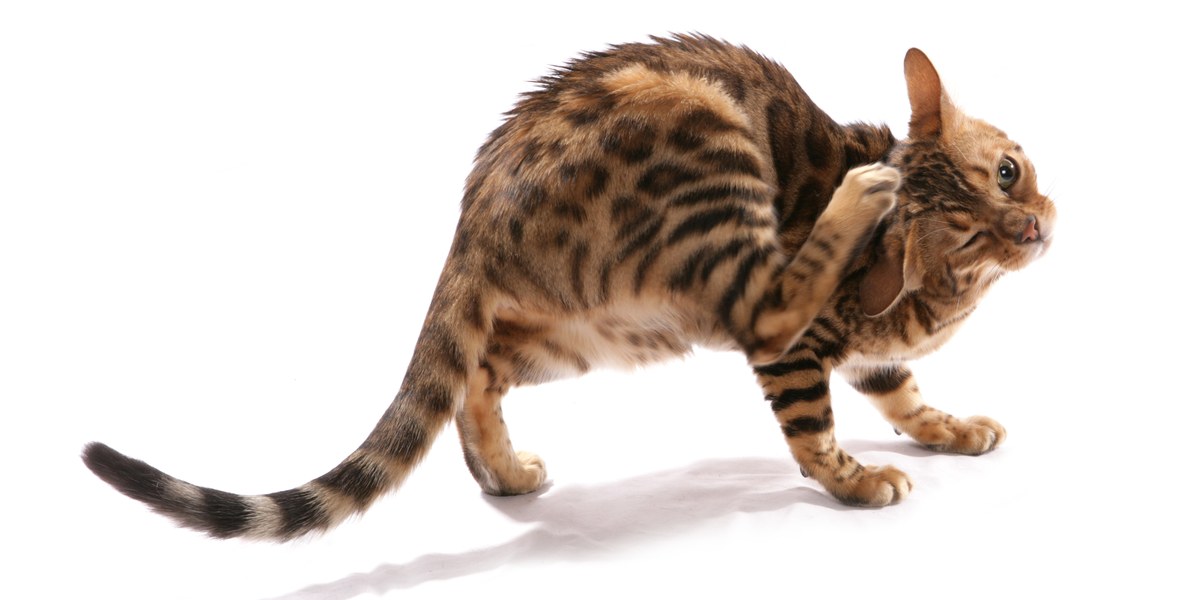
A steroid is an organic compound, with hundreds of steroid compounds found throughout nature. Steroids make up the structure of cells. Cholesterol, for example, is a steroid that composes the structure of cell walls.
Steroids can also act as hormones that act as signal messengers in the body. Most folks are familiar with steroid hormones like estrogens and testosterone.
Anabolic steroids are ones that act in the body to increase muscle and bone growth. These are the ones we often associate with professional body-builders.
A third class of steroids are corticosteroids. Corticosteroids are involved in a variety of functions within the body, including stress response, immune response, regulation of inflammation, and others.
There are natural corticosteroids produced by the body, like cortisol, and then there are synthetic man-made ones, like prednisolone.
What Does Prednisolone Do for Cats?

Prednisolone can be used as an anti-inflammatory at lower doses and as an immune suppressant at higher doses.
At lower doses, prednisolone may be used as an anti-inflammatory. A cat with a red, itchy skin infection for example, may benefit from an anti-inflammatory course of prednisolone to reduce inflammation and itching while antibiotics address the infection.
At higher doses, prednisolone can be used to treat conditions caused by an overactive immune system by suppressing its effects. This can include conditions like feline asthma, caused by the immune system’s response to airborne allergens, and inflammatory bowel disease, caused by the immune system’s response to food allergens.
Predisone vs. Prednisolone

You might wonder why you’re reading about prednisolone, when prednisone is more common. You might also wonder if the two are basically the same thing. The simple answer is they are…and they aren’t.
Prednisone and prednisolone have the same effects on the body. This is because in most species, prednisone is very quickly converted to prednisolone by the liver. But a couple of animal species, including horses and cats, cannot efficiently absorb or convert prednisone to prednisolone.
So this is why, while we often use prednisONE with dogs, we should only use prednisOLONE in cats.
Side Effects of Prednisolone in Cats
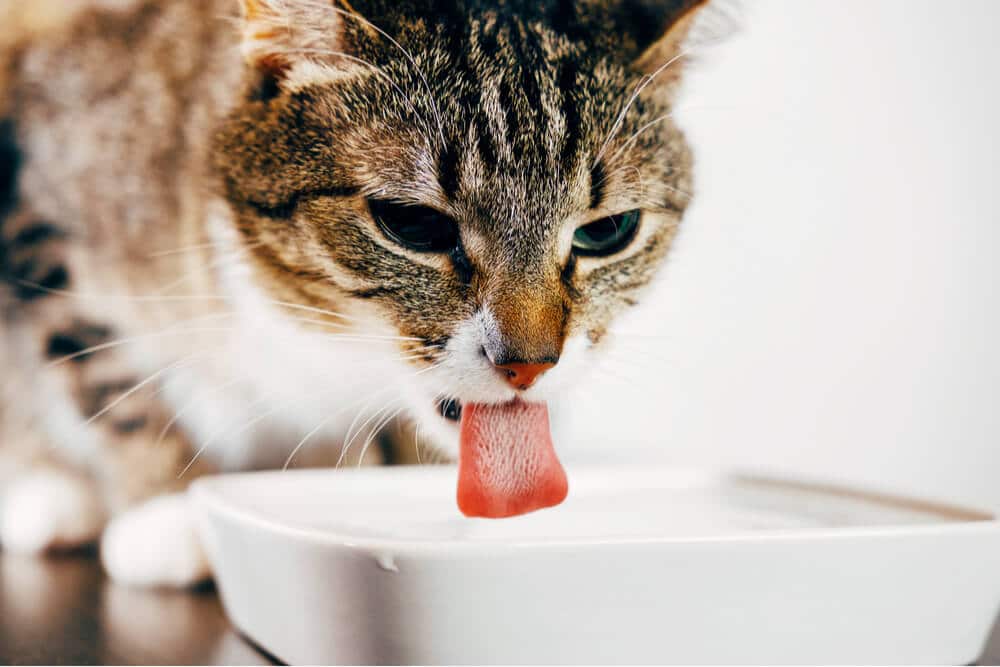
The side effects of prednisolone for cats include increased water intake, increased appetite, and occasionally, digestive upset.
Cats tend to tolerate steroids better compared to dogs and we see fewer adverse effects in kitties. However, there are some important things to look out for, especially for kitties on higher doses of prednisolone.
Increased Thirst
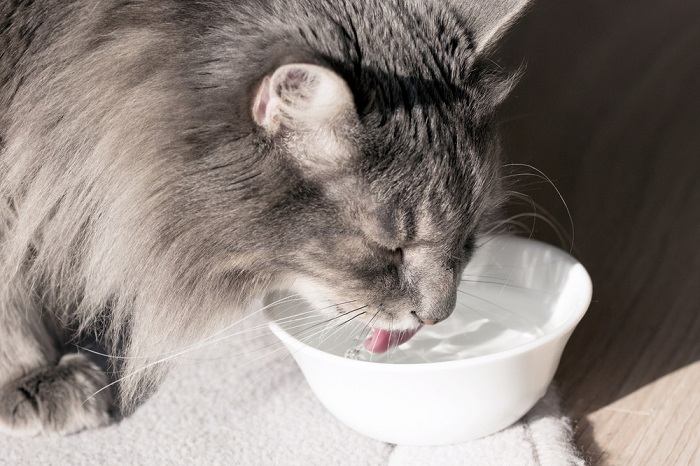
Occasionally, a pet parent may observe their cat on prednisolone to have an increased water intake and subsequent need to urinate more. You might find yourself refilling the water bowl more often, and cleaning up larger urine clumps in the litter box.
Increased Appetite
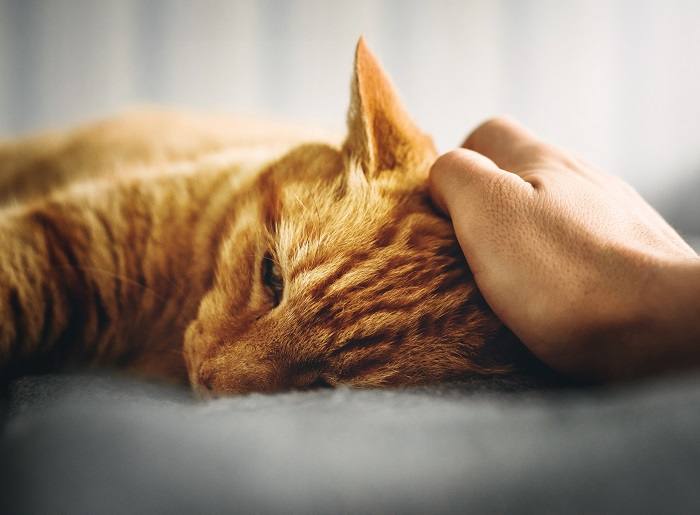
Steroids can also cause an increase in appetite, which can lead to weight gain. For some conditions that cause weight loss, like inflammatory bowel disease, weight gain is desirable, but this is not always the case, so weight should be closely monitored.
Digestive Upset
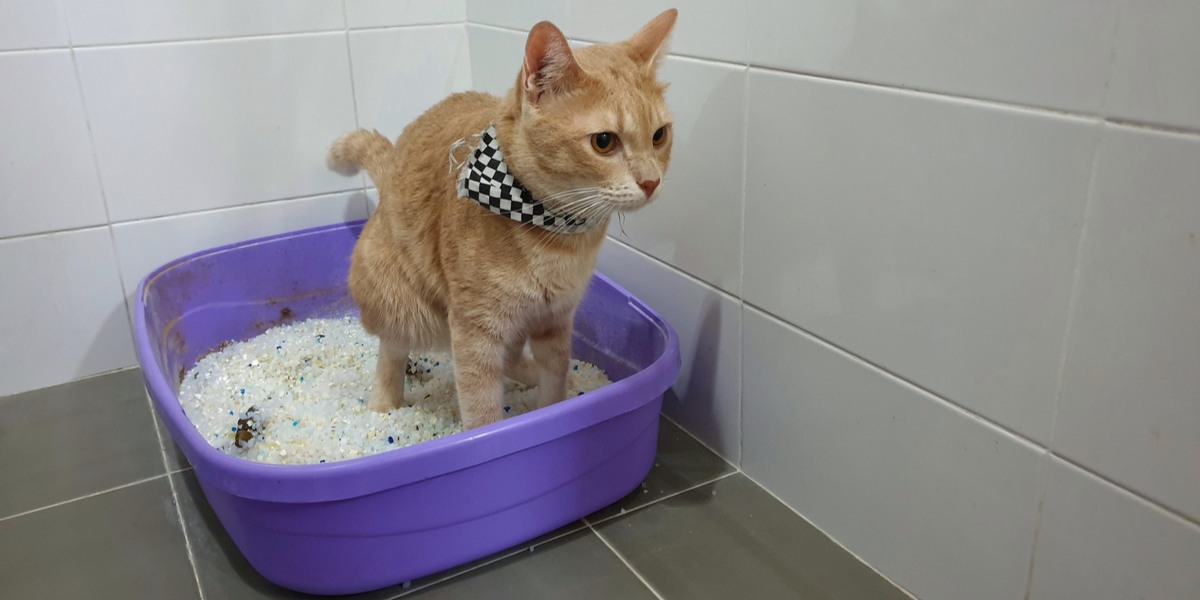
Steroids may cause digestive upset in some cats, usually some soft stool or diarrhea if it happens.
Separate, Long-Term Effects of Prednisolone Therapy Can Also Be Seen.
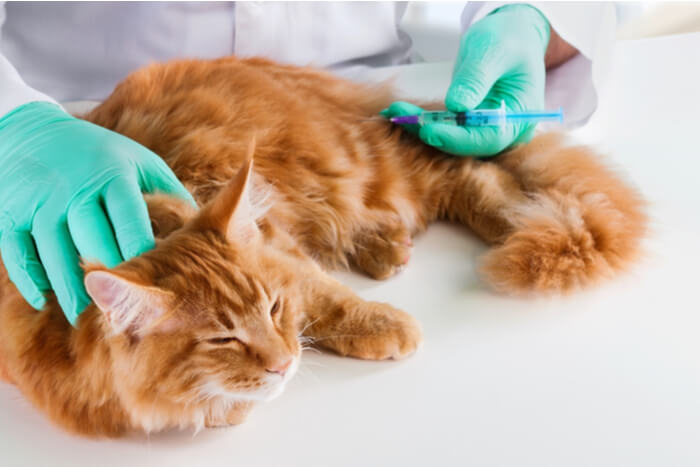
Hypoglycemia is seen in cats
Steroids can contribute to increases in blood sugar in most animals, but in cats, this effect seems to be more prominent. For this reason, steroids should be used cautiously in overweight cats at risk for diabetes mellitus, and should not be used in diabetic cats, as steroid use will interfere with blood sugar regulation.
Long-term use of high doses of steroids can also lead to more serious side effects like a thinning haircoat, and ironically secondary skin problems.
This, in combination with other effects like excessive drinking, urination, and appetite can be lumped into a condition known as iatrogenic hyperadrenocorticism, or synthetic steroid-induced Cushing’s disease. Fortunately, the effects are reversible if steroids are stopped.
And lastly, although the specifics are still debated, there is a perceived risk for cats at risk of heart disease developing heart failure on steroids.
This seems to occur uncommonly in cats with no signs or symptoms of heart disease. Steroids should be used with extreme caution in any cat with known existing heart disease.
As with any medication, using prednisolone must have benefits that outweigh potential risks, especially when used long-term.
Prednisolone for Cats: Dosage
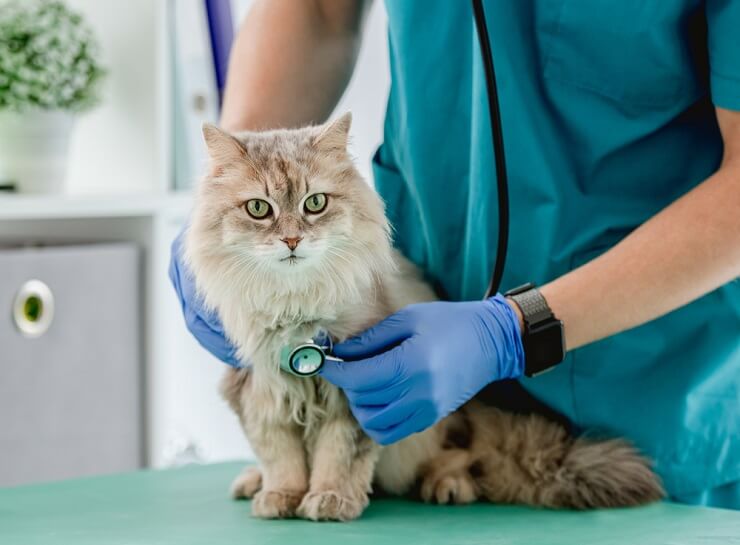
If your cat is experiencing an abnormal heart rate, your veterinarian will do a complete physical exam, including listening to your cat’s heart.
Steroids like prednisolone have a very wide dosage range depending on the condition being treated. Lower doses are used to address inflammation while higher doses will suppress the immune system. Compared to dogs on prednisone, cats generally require higher doses of prednisolone.
Because of the high degree of variability in dosing, your veterinarian should decide what dosage of prednisolone will be best for your kitty.
Conclusion
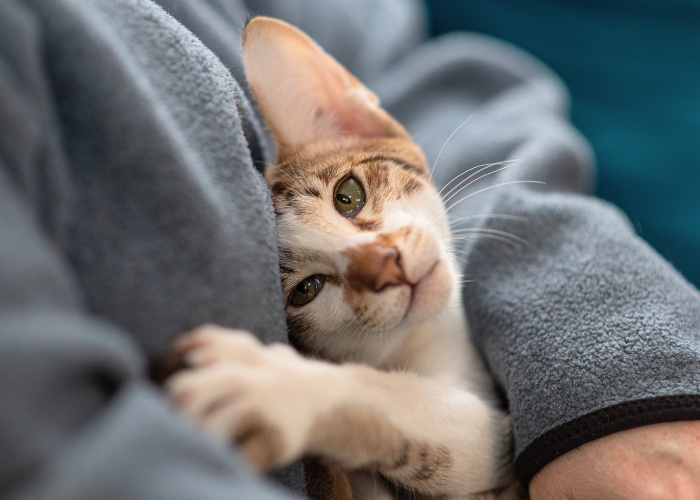
Steroids like prednisolone are extremely useful medications because they have a broad range of dosage and effects. They are necessary to get some inflammatory and immune-mediated conditions we see in cats under control.
Cats are more resistant to steroid side effects than dogs. Steroids are also attractive options as anti-inflammatories especially given that our ability to use non-steroidal anti-inflammatories in cats is very limited.
All the same, steroids must be used judiciously and cautiously under the direction of a veterinarian. Also, remember that only prednisOLONE and not prednisONE should be administered to cats. So if you have a dog at home, don’t share any steroids prescribed for your pup (or for yourself) with your kitty.
Frequently Asked Questions
How Long Does Prednisolone Take to Work in Cats?
Generally, cats with inflammatory conditions will see improvement within just a day or two of prednisolone therapy. With more complicated conditions or immune-mediated conditions, noticeable improvement may take longer, but still generally within several days.
What Does Prednisolone Do for Cats?
Prednisolone is commonly used in cats as either an anti-inflammatory or as an immunosuppressive medication.
Inflammatory conditions may include any number of skin conditions, inflammation from an injury, or inflammation caused by arthritis.
Immune-mediated conditions where the immune system actually causes damage to the body in response to an initiating cause like allergens, may include feline asthma, inflammatory bowel disease, autoimmune diseases like immune-mediated hemolytic anemia, autoimmune skin diseases, and many others.
Prednisolone may also be used to treat and manage certain types of cancers, especially lymphoma.
What Are the Side Effects of Prednisolone for Cats?
The most common short-term effects in cats may include increased drinking, urinating, and appetite. Some cats may also develop mild signs of digestive upset, like diarrhea.
Over a longer time period, and especially at higher doses, we can see these short-term effects in combination with long-term effects like weight gain, thinning hair coat, and lethargy.
Steroids should be used very cautiously in overweight cats, as they can contribute to further weight gain. They may also increase blood sugar in cats more compared to other animal species, which may put an overweight cat already at risk for diabetes at an even higher risk.
Prednisolone should also be used cautiously in cats at risk for heart disease. Since many cats at risk for heart disease show no outwardly abnormal signs, your veterinarian may recommend a screening test, especially if long-term use of prednisolone is being considered.
Alternative treatment options to prednisolone therapy should be considered for cats diagnosed with diabetes or known to have existing heart disease.
How Much Prednisolone Can You Give a Cat?
Prednisolone, like all steroids, has a very wide dosage range, depending on its intended use. This is why your veterinarian should determine what dosage and protocol is best for your cat, depending on the condition being treated.



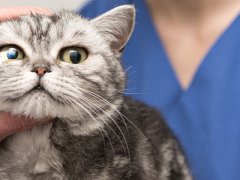
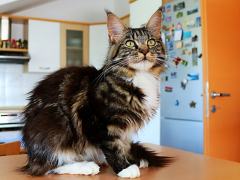
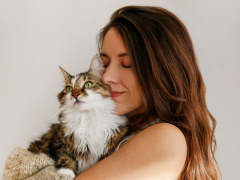


Just to be clear, cholesterol is found in animal cells MEMBRANES since animal cells do not have cell walls. Plants do not have cholesterol but use similar type sterols in their membranes and the cell walls are made of carbohydrates.
Now a question. Can prednisolone be used to treat stomatitis in cats, at least short term?
Thank you.
Thanks for your very astute clarification. In answer to your question, prednisolone can be used to address some cases of stomatitis, which for our other readers out there is a generalized painful inflammation of the mouth and gums. Prednisolone can help reduce the inflammation and relieve some of the pain. However, you are correct that this is often just a short-term therapy, as we always need to try to find out what the underlying cause of the stomatitis is, to address it more specfiically.
Hi,
My cat has been overgrooming on her abdomen for about 2 weeks – showing no signs or irritation, rash, bites or, broken skin or marks of any kind.
No changes at home and no exposure to outdoors – but my vet prescribed her prednisolone (one 5mg tablet, twice a day for 14 days, then one tablet once a day for 14 days) and gabapentin (1 capsule twice daily for 30 days).
Is this necessary? It was quite a pricey bill and a lot of medication for just some overgrooming… but I’m no vet.
Hi Kayla, you may want to consult directly with your veterinarian or bring your questions to the All About Cats community, where you can connect with our expert moderators and further discuss this issue.
Try changing your cat’s litter to a no or very low dust type. Change the brand as well. My cat over groomed so much he got all the way down to clear-cutting all the fur off his belly, He had a pink spot about 4 inches in diameter. The vet wanted to do a lot of allergy tests and give him shots. I did a bit of research and found that some cats over groom because the litter dust gets down to their skin and irritates it, so they over-groom trying to clean it and remove the irritant. I switch to a litter that is made out of walnut shells and its works great. As soon I switched, I gave Bubba a bath and his overgrooming stopped, His fur grew back and its been fine ever since.
Hi Gina,
You do make an important point, which is that if we can determine what an underlying allergen is that’s causing a problem, and eliminate it, there’s a good chance that signs of an issue will improve or possibly resolve without the need for long-term management with medication. The challenge with environmental allergies is that it’s often difficult to lock down just one allergen responsible and if you can, to reaonably remove it. It sounds like you may have been fortunate enough to figure this out for your kitty with the litter change, which is wonderful. However, it’s still important to realize that overgrooming can have many causes. Besides just dermatologic causes, like allergens, stress and behavioral issues are often causes as well. For that reason, it’s very important to still have a veterinary exam to work through some of those possiblities.
Hi Kayla,
While I can’t comment specifically on what’s causing the overgrooming in your kitty, since your vet has the benefit of a full physical exam, I can perhaps provide a little insight on the rationale behind the medications prescribed.
Overgrooming behavior can be complex and sometimes it’s difficult to lock down an underlying cause. Because cats can’t tell us how they’re feeling and because testing available to us for some situations may not always provide a clear answer, it is common in veterinary medicine to prescribe a treatment course and see how a patient responds. If successful, this has the potential to provide resolution of the problem and relief for the kitty, as well as narrowing down an underlying cause.
Prednisolone can assist with possible itching or an irritation sensation leading to excessive grooming. Allergens and sources of itchy skin are not exclusive to the outdoors and exclusively indoor kitties can have these issues as well.
Gabapentin is widely known to provide a calming effect for cats and since overgrooming can also be part of stress-related behavior, gabapentin will sometimes be prescribed to see if a stress-realated behavior may improve or resolve.
Your vet has a treatment plan in mind, whether this medication trial is successful or not. As Mallory said, if you do have questions about why a particular medication was prescribed or what the overall plan of approach is, make sure to bring this up with your vet.
Additionally, I get the impression a little that the overgrooming behavior does not bother you terribly. Although it can be a symptom of a skin or behavioral issue, if you feel the overgrooming is mild and not significantly impacting your kitty’s life or relationship with you, make sure to let your vet know that.
If you don’t have a recheck exam scheduled for your kitty yet, make sure to call in to your vet when the prednisolone course and gabapentin are finished to let them know how things are going. I can tell you firsthand that I always appreciate updates if something is working well, and even when it isn’t.
I think I read that Prednisolone chewy tablets will dry out if not kept refrigerated, but this will not affect the efficacy of the med. Is this true? If I dry the tablets, they will be easier to add to food.
Hi Pam,
If the prednisolone tablets you have are chewables, I’m assuming you’re getting them through a compounding pharmacy. Because formulations can differ between pharmacies with compounded drugs, it’s always best to contact the pharmacy itself and speak to a pharmacist or pharmacy tech about questions of shelf-life, storage, etc. What you say would seem to make sense to me, where the tablets might dry out a bit but their drug potency would not be diminished, but that’s a question even I would call the pharmacy itself to verify.
Hi,
My cat suddenly developed non-regenerative anemia. He was originally thought to have a parasitic infection and theraphy was initiated on that premise using antibiotics and steroids. The PCV was so low (12) and his fever so high (105.5) that a transfusion was performed. Simultaneously PCR tests were run to identify the most common specific parasites, but all returned negative.
The antibiotic was discontinued and an auto immune theraphy was begun with a steroid and cyclosporine. That protocol of transfusion and auto immune treatment lasted approximately 7 days before his condition relapsed to near original conditions.
A second transfusion lasted approximately the same length of 7 days with a move to a teaching hospital where multiple additional tests were performed along with additional PCR tests, X-rays, ultrasound and a biopsy of the spleen which appeared thickened. No definitive identification of a cause for his condition has been made. A third transfusion has now lasted 14 days but PCV readings today are down to 14 but only slightly elevated fever of 102.4. He is still on the cyclosporine and steroid treatment. He is eating and drinking water but becoming more reclusive. Any comments on this condition that may be out of the ordinary cause?
Hi Bruce,
I’m very sorry to hear that your kitty is having such a hard time, with what sounds like a very serious and uncommon disease process. Sudden anemias like this can be very difficult to manage, especially if they don’t fit into the category of ones that respond quickly to prednisolone and antibiotics. If an infectious cause has not been found, an immune-mediated cause is typically to blame, but under that umbrella of immune-mediated disease, the list of sub-causes, if you will, can be fairly exhaustive. It sounds like a lot of testing has been done already. I assume a bone marrow sample has been done or at least discussed, because that would be an important thing to be considered with other testing coming back as it has. Sometimes, unfortunately, a specific cause is not found, and therapy has to be catered or altered to see what response is seen. All the testing can at least rule out many things and narrow the treatment focus. Prednisolone typically remains a hallmark drug for these conditions until a successful long-term medical therapy plan can be developed with a long-term drug like cyclosporine or a similar immunosuppressive drug, at which point the pred can be slowly tapered. Not being a part of the case, that’s probably the best I can comment on your kitty’s situation, but university teaching hospitals have the best and latest on treating these uncommon and more severe cases of anemia. I truly wish for the best outcome for him.
Hello,
Ive been gathering some info on prednisolone after noticing that the potential side effects were the same as many of the symptoms of a feline uti, which is what the prednisolone and synulox (amoxicilin and clavulanic) were prescribed for. My cat was also diagnosed with anemia at the same time as the uti, which is why the second sentence of your post got my attention. It reads
“Sudden anemias like this can be very difficult to manage, especially if they don’t fit into the category of ones that respond quickly to prednisolone and antibiotics.”
So my question is, Are prednisolone and antibiotics commonly used to treat anemia? Which antibiotics are typically used? I would greatly appreciate any info on this as I haven’t heard this from my cat’s doctors.
Thank you for your time.
Hi Jackson,
Apologies for the late reply.
The potential urinary effects of prednisolone would tend to vary from what we’d see with a UTI. With UTIs we’re usually seeing smaller more frequent bouts of urination, and sometimes it appears the cat is straining/uncomfortable. Increased drinking is not always something seen. Classic side effects from steroids are increased drinking behavior along with increased urine volume. While there can be an urgency and more frequent pees, it’s usually a lot of urine at once. But fortunately in cats, these side effects are uncommon to see until you’re at high doses or giving them for a long time.
For the anemia, there are different severities. Looking at Bruce’s post, you can see his cat was very severely affected by something causing the anemia and his cat was very sick from the anemia itself. More mild anemias (maybe up to 5-7% points below normal) can occur alongside any chronic disease process and it’s common to see these in older patients. This is called anemia of chronic disease. Unlike the anemia in Bruce’s cat, most cats are unaffected clinically by a mild anemia of chronic disease.
For clinical severe anemias like in Bruce’s cat (maybe less than 20% total), doxycycline is a common antibiotic choice, because organisms like flea and tick borne organisms and Mycoplasma hemofelis are susceptible to it. Because immune-mediated disease is another common cause of severe anemias, steroids are also commonly used.
Is he on prenisilone? Also check out NHV natural products that counter side effects of steroid. My cat with leukemia had 1 transfusion and the above treatment and after 10 months is in remission. Vets do not suggest natural supplements and that is NOT acceptable.Vet advised to put down /and can’t figure out why he is doing so well!
Hi Sarah,
Thanks for your insightful comment. I’m very glad to hear your kitty is doing very well with what is typically a pretty devastating disease. However, I would counter your observation that veterinarians do not support use of natural supplements. I always keep an open mind and there are several supplements that I do support use for but mostly because there are clinical trials or research evidence to support their use. The market for pet supplements is huge and unfortunately, not very well regulated. While some companies take extra steps to ensure they have high standards in their manufacturing process, the degree of oversight they take is entirely up to them. This is very different from medications where certain manufacturing standards must be met by federal law. The challenge this provides for most veterinarians is that a well-meaning pet parent may find a supplement online and ask their vet about it but there’s so many products out there, there’s a good chance the vet may not have heard of it. And on top of that, there’s no way for that vet to know if the ingredients in that supplement are safe, and likely no data to prove that it will work and provide the results a pet parent is hoping for. At least for prescription medications, there are extensive trials and testing performed so that we have an idea of what outcome we should see and what side effects may be possible and the likelihood we might see them. Not so with supplements. Supplements are often seen as harmless and preferable to using medications but this is also not entirely true, as ingredients can vary widely since companies are not required to adhere to specific standards. Supplements are also heavily marketed to be able to address a whole host of maladies, almost to the point of appearing to be cure-alls. And companies can suggest this as long as very careful wording is used. However, in very small print somewhere, you may find the phrase “results not typical”. And this is important to remember. Even if you see great results from a particular supplement product, you have to remember that the next person who uses it for their pet may not see the same result. You may also see a phrase in small print saying something like “this product is not designed to treat any medical condition”. They all have to include that somewhere, even if it’s small and hard to read. So knowing all of this as a veterinarian, if a client brings a supplement to me and asks if it will help with their pet’s cancer or another serious condition, there’s no way I’m going to tell them yes. I can’t vouch for the ingredients, there’s likely no data to support its efficacy (although some supplements do have this, it is often the exception rather than the rule), and there’s always the chance it may cause harm while not doing anything for the patient (and this may just be the days or weeks of a disease progressing while an unfounded supplement is used instead of an accepted standard medical approach). I truly value having a quality supplement in my toolbox as an option for my patients, but only if there’s solid science to support its use. While the NHV supplement line you mention was developed by a holistic vet and they appear to strive for high manufacturing standards, it would still be best to have an exam and consultation with an actual holistic vet in your area if natural/herbal remedies are something that you’re interested in for your pet.
Good explanation, thanks!
You’re welcome, Jackson, glad it was helpful.
My 12 year old cat Louie is being treated for IBD. He takes 5mg tab prednisolone per day. Vet wants to wean him to a lower dose or stop the prednisolone. We began step down from 5mg/day to 2.5mg/day, but symptoms started back up after 5 days of the lower dose. Vet said to step him back up, so I did and symptoms resolved.
Problem is, vet clinic suddenly closed down business, so I don’t know how to further manage the step down process. Example, how long to leave him steped back up to 5mg/day, then what should step down dose be (since 2.5mg brought back symptoms), then how long to leave at step down dose (assuming no new symptoms), then what should be next step down dose?
Dr. Chris, do you make paid Tele Medicine appointments?
Thanks.
s,Can you please explain process for weaning cat off (or to lower dose) of prednisolone.
Hi Nancy, thanks for your comment. I’ve passed it along to Dr. Vanderhoof, and you should receive more insights soon. – Mallory
Hi Nancy,
I’m sorry to hear your vet suddenly closed. That’s very frustrating I’m sure. I hope you’ll be able to find another one in your area. If you check out the All About Cats forums, there is a thread about what to look for when looking for a new vet, you might find it helpful!
For Louie, I can provide some limited guidance to help you along until you can get re-established with a new vet practice. IBD is an immune-mediated disease and most immune-mediated diseases cannot be cured, but can be managed. This is important because I would dispel the expectation that Louis may ever be able to be completely off a steroid. Generally, when we treat immune-mediated diseases, we try to first get the signs of disease under control, and then if we can, reduce the dosage to the lowest dosage and frequency that is still effective at managing the disease.
Your vet was working on this by trying to get the dosage down as low as possible, which helps mitigate any long-term side effects from steroids while still managing the disease. It sounds like the two of you found the lowest dose that managed Louie’s signs. The best thing to do right now is to probably continue at the 5mg per day. It’s quite possible Louie will need to be on this dosage for life. When you’re able to establish with a new vet, you may find that he/she may want to just continue this dose, or based on how Louie’s doing, eventually try dropping the dosage again after a few weeks or months. But if the signs return again, it’s unlikely you’ll ever be able to get off of the prednisolone.
Unfortunately, I can’t offer any telemedicine services. While they’ve been very popular especially this past year, there are many rules and laws that govern these types of services and they vary a lot depending on each state. State licensing laws also place restrictions on the type of advice we can give outside of an established relationship through our veterinary practices. Telemedicine also has a lot of limitations. Since our patients can’t tell us what’s wrong, physical exams are so important as a part of care. That’s why I would encourage you to have a look at our forum thread on the topic for some guidance on getting established with a new vet to help continue Louie’s care.
I truly hope that guidance is helpful to you.
Dr. Vanderhoof
My boy cat contracted FIV 8 years ago he is now 12. He has been very healthy and during a routine annual check we took some bloods to see how is was going. Only to find very low levels of platelets count. First test was done in May at 70 then due to COVID we had lockdowns and various issues the next test wasn’t done for a couple of months and when the second bloods were done the level dropped to 31. We immediately started 5mg of Prednisolone and tested in a week and his levels went to 244 in 7 days. Then we tested 3 weeks later and it went back down to 190 so we decided to not reduce the dosage and test again in 3 weeks which was yesterday unfortunately his levels went down to 150 although normal the results are on the downward slide with no explanation. My vet wants me to keep the cortisone going at 5mg until they discuss alternative options and work out alternative medicines, they may even increase the dose which I am not keen on.
They cant explain why this has happened and why the levels dropped. He is putting on weight and is over eating and its been difficult as I have another FIV cat (she is fine at the moment) and they both normally graze eat. Now he is eating all the food and leaving nothing for the girl cat; she is not one to eat in one go and its hard to change her eating behaviour. The boy cat is stalking around constantly looking for food now its very distressing. My question is threefold why has the levels dropped considering he is on the same dose for over 7 weeks and did so well initially? What other medicines can we try that don’t have the side affects of cortisone (obesity) but will maintain the platelets? And thirdly any suggestions for feeding how to do change 12 years of grazing behaviour so she gets some food before he eats it all? Any advice would be great . Thanks
Hi Jane,
I’m so sorry to hear both of your kitty’s have Feline Immunodeficiency Virus (FIV). This is a virus that I have found, in my own experience, may cause no noticeable issues sometimes for years, and then suddenly we see some effect from it, whether a secondary infection, immune-mediated disease, or what have you. These effects, when they happen. can be frustrating and challenging, because the virus itself cannot be eliminated and our efforts are aimed at trying to manage the secondary condition.
As a disclaimer, I cannot provide specific treatment recommendations, but hopefully I can provide some helpful insight.
In answer to your 3 questions:
1. Since there was an excellent response to the prednisolone initially, it’s not clear to me yet if we’re truly seeing a pathologic reduction in platelets again or not. When starting prednisolone, it is possible to see an initial thrombocytosis, or a real dumping of platelets into the bloodstream. It’s possible we’re seeing some effects of that calming down. 150K platelets with some presumed clumping on the side, is still very adequate for a cat. If we continued to see platelets reduce below 100K though, I would be worried that the pred is not helping as much as it was. As your vet may have discussed, this sounds like the FIV virus may be either directly affecting platelet production in the bone marrow, or the immune system is attacking platelets in response to the virus. We have to remember that both viruses and the immune system are constantly changing and adapting, so frustrating changes like this, where everything seems to be going well and then suddenly isn’t, can occur for no apparent reason. Some cats do need much higher doses of steroids to provide immunosuppression, which is why your vet has discussed possibly increasing the pred dose.
2. It sounds like you’re already having some issues with side effects of the prednisolone with the increased appetite, however. When side effects like this become problematic, it is reasonable to look into other immunosuppressive medications, which it sounds like your vet is looking into. Cyclosporine, for example, is a common one that may be used. There is not one I could specifically recommend, as there is not one that is specifically proven over others to work better. It is common for this decision to be based on a doctor’s training and clinical experience. Sometimes, consulting with an internal medicine specialist may be helpful in these cases, which your vet may also be considering as well.
3. The best way that I have found to control grazing behavior in a household with more than one cat is to do it in a controlled way using a microchip pet feeder, like the SureFeed microchip pet feeder. What you would do is ensure your girl cat (or generally the cat you’re not trying to control feeding for) has a microchip (which if she does not already, your vet can place one for you). The feeder can be set to only her microchip frequency, which will allow her to access her food whenever she wants, but your boy cat will not be able to access it, even if he’s sitting just behind her waiting. This allows you to control your boy cat’s eating much better and your poor girl kitty to not have her food stolen. It has an accordion-style door which is very safe. Sometimes it takes a little bit of training for a week or two to get a kitty used to the feeder, but I have found it is worth it.
Make sure to continue communicating with your vet, as it sounded like they were looking into some options. But I hope this info has been helpful for you.
thanks for your response I did try the microchip feeder but my girl cat refused to use them I tried for 4 weeks in the end I had to return them and go back to graze feeding. I spoke with my vet and they dont think he has put that much weight and are not concerned about it. They have seen a case before that went backwards on the plalets count on 5mg and died; so they have increased the dose to 10mg which I started today they feel that is the only way to go otherwise they feel it will continue to decline. I will let you know how it goes when I go back in 3 weeks for next blood test. if it works its maybe likely that he will need to remain on it for a while. thanks again
My cat was diagnosed IBS. He is 12yrs old. My vet has him on 0.3 ml of prednisolone, lactulose (verysm amount when needed) and gabapentin 1/2 ml at night because he is so restless. This morning he was vomiting & had diarrhea. Is this because of the medication? Unable to see my vet because she is so booked. He was very sick .
Hi Mary, unfortunately, we’re unable to answer that question based on your description alone. I would recommend contacting your veterinarian by phone. You may be able to get some information without going into the clinic.
What a great resource! My cat Chewy, is being treated for IBD with prednisolone. Since the side effects are similar to the symptoms, (increased appetite, diarrhea, etc..) How do we look for signs of improvement?
Many thanks,
Luke
Hi Luke,
Good questions. First, remember that while side effects are always possible, they are not guaranteed to occur. Many cats tolerate prednisolone very well and it’s uncommon to see negative signs of inflammatory bowel disease (IBD) like vomiting and diarrhea, to worsen.
In fact, many cats experiencing those digestive concerns as a result of IBD usually have decreased vomiting frequency and improvements in stool consistency.
If your cat has experienced weight loss as a result of IBD, monitoring for weight gain is the biggest thing we look for as a general sign of improvement. Even if you were seeing some degree of vomiting or some soft stool persist, seeing a positive weight gain would still mean that the therapy is helping.
I typically get concerned if our digestive signs persist at the same level or worsen, and especially if weight loss continues. If so, further diagnostic testing may be warranted or discussing alternative medication options.
It has been a challenge to live in a small town with few Veterinarians. My female cat Popoki (cat in Hawaiian). She is approximately 14 years old. She was declawed long before I adopted her. As she aged, going to the vet I have gone too for years, she started to develop arthritis in her front legs. Dr Mary started her on Prednisolone 5 mg once a day. She reacted positively immediately. Then covid changed everything in our small town. I am 78 and the vets that took over the practice were not willing to continue prescribing it, due to possible side effects. Warning me that I needed to tyder her slowly. As i reduce it she stops eating, sleeps more. I restart it and she is fine. I just want her comfortable for as long as she has. Am I wrong? Thank you for your time and attention.
Hi Kathleen,
Thank you for sharing. Personally, I do not feel you are wrong in your assessment at all. I also do not generally prescribe prednisolone routinely for arthritis in cats, probably for some of the same concerns that the newer vets at your clinic have raised. We don’t currently have a very good non-steroidal anti-inflammatory that we can safely use in cats longterm like we do in dogs, so often we’re relying just on pain medications like gabapentin to help with signs of discomfort, because steroids can have long-term concerns like the ones mentioned in the article.
But in medicine really of any kind, our goals are always deciding if our treatment is helping a patient more than the risk or presence of known side effects. It sounds from your description that Popoki has seen a more favorable response from using prednisolone than any negative effects. Generally, I find many cats do well at 5mg once a day as a general anti-inflammatory for appropriate conditions, without exhibiting too much in the way of side effects.
While the risk of side effects may always be there, and it sounds like you understand that possibility, it also sounds like Popoki has seen more benefits than detractors on prednisolone. So if this is helping a lot with her quality of life, I really would not feel it’s wrong at all to continue. Oftentimes, having a conversation with your vet along those lines of “I understand the possible risks and I’ll monitor for those, but my cat’s quality of life is greatly improved using this treatment strategy and visibly reduced without it” will help them understand your position better and they may be more open to working with you on continuing that approach.
Thank you! For Popoki to have a quality of life has been my main concern. This has been the second time i tried to reduce the Prednisolone. The first time we tried gabapenton and had terrible side effects, so thats out. With thePrednisolone her appetite improves an the pain in her front feet (from declawing) improves. It looks like I will be able to work with the new powers that be.
Hi! My cat Shelby age 12yrs has been on Prednisolone 5mg for 8 days now for vomiting so much (inflammation in her gut). Has been doing great. Appetite improved. But last couple of days she started sneezing a lot and more so at night. Is there any correlation between the steroid and the sneezing? Has no other symptoms like runny or drainage from her eyes. Plan on calling my vet tomorrow but probably not reach her to later in day.
Thx you
Hi Garnet,
I would think it unlikely your kitty’s sneezing is directly correlated to the prednisolone. Prednisolone is a potent anti-inflammatory and it would not appear that Shelby is on a dose high enough to suppress the immune system either. There can be many causes for sneezing in kitties, and it would be best to run through some of those with your vet and see if an exam may be needed. Glad to hear she’s doing well with the vomiting though!
Hi my cat was put on this medication for 1x a day for a week along with amoxicillin 2ce a day and I mistakenly gave him the steriod 2ce a day as well. He had crystals cleaned out and hadn’t been eating and was tired acting prior to going to the vet, but A LOT of money later he is still lethargic and won’t eat much….has to be hand fed and will drink water and use the box, however he isn’t very mobile and is wobbly when he walks. I called the vet 4 days ago and they said he should be fine that it would wear off and while he shows mild improvement it has me seeking another opnion…please help! He’s my Big Pretty and my guy. 🙁
Hey Kelly, I know it’s been a while since you asked about this—how is your cat doing now? I’m afraid I can’t tell you anything more than what you learned from your vet. It sounds like everything is going to be fine, but I understand your concern. Hope all is well!
Hi Mallory….thank you for your kind reply, Unfortunately, it wasn’t the medication, my baby was in liver failure and has crossed the bridge. It was one of the most painful losses I’ve ever had and I miss him so much. This is a wonderful site and I will add it to my favorites, a I have other kitties. But My Big Boi is going to leave a big hole in my heart. Thank you and I hope all your kitties are well.
Oh no, I’m so sorry to hear that. Thank you for following up, and I wish you peace in this difficult time. Take care, okay?
My 13 year old kitty, Maya, has had soft-stool diarrhea for over a year. I tried probiotics with no success. I was working with a vet who suggested changing her diet but when that didn’t work, sent me to an internal medicine specialist vet who recommended Royal Canin rabbit selective protein and Prednisolone 5mg capsules daily. I’ve been doing both of these for two months now and they aren’t working. Sometimes, her diarrhea is just puddling-like. Sometimes, it’s a bit more liquid, more explosive when it comes out and I have to wipe it up from the side of the litter box. We are treating this as though it’s IBD because all the other tests he ran (liver, kidney, etc.) were normal. But I don’t like keeping her on this medication when it isn’t working. I don’t know what else could be causing this. I can tell you that she is more aggressive with my other three cats and that she is ALWAYS hungry, very frequently meowing for more food. I manage giving her just one can (5 oz) of the rabbit each day in small, frequent portions so she isn’t overeating. Still, she’s getting no better and I am sure it’s the Prednisolone that’s causing her change in behavior. I’m not happy about that.
I thought I’d ask first what else besides IBD can cause her diarrhea. We eliminated bacterial and fungal infections in her initial tests. What I’m asking is what else I can ask the internal-medicine vet to check for or, if it is IBD, what else we can use to help resolve it besides the Prednisolone which isn’t working and is having side effects. Do you have any suggestions I can discuss with my vet on our next visit? The only thing the vet mentioned last time was a very expensive ultrasound. I’m not doing that if it may not be necessary, especially since she’d have to be put under anesthesia, which i don’t like for her. Any guidance you can provide would be helpful.
Hi Karen,
Thanks for all of the information, and sorry to hear your kitty is having a hard time.
I’ll split my response into two. One will be insight on other management strategies for IBD. The other will be related to other testing options to consider. I can’t provide direct advice on what to do, but consider this info as some talking points to help in further discussions with your primary vet and/or the internist.
1. If you do feel that your kitty has developed some side effects while on prednisolone, budesonide is worth considering as an alternative medication. It is also a steroid, but has more of a focus on the digestive tract itself and less on the rest of the body. Detractors include a higher cost and need to be compounded. Here is the link for All About Cats’ article on budesonide so you can read more: https://cats.com/budesonide-for-cats.
For diet, the rabbit and pea is a good one and a favorite of mine as well. However, in uncommon cases, I have seen cats develop diarrhea on it. If a novel protein diet like that isn’t working well, a hydrolyzed protein diet like Royal Canin HP or Hill’s z/d would be worth considering. I had to change my own IBD kitty’s diet three times before we found a good balance.
Including Vitamin B12 supplementation, either orally or as injections weekly for several weeks then monthly, is advocated by many for best success in treatment of IBD. Consider asking about this more if it hasn’t come up yet.
2. In terms of testing to consider. The definitive test to diagnose IBD is surgical biopsies of the intestinal tract. Most folks don’t opt for this given how invasive and expensive it is to do it. This is why I do consider ultrasounds a first line way of looking into the possibility of IBD more. While expensive, it’s much less invasive. If labwork is normal, you can make assumptions based on symptoms, but ultrasound is pretty non-invasive and can provide good information. It is however possible (as with many tests) that it may appear normal while disease can still be present. This can be frustrating, especially given the cost of an ultrasound. You did mention anesthesia being involved. I would clarify that with your provider. Anesthesia is not commonly needed for ultrasounds, though sedation is very common. Sedation allows for a much less stressed kitty and a more full and complete ultrasound exam, but the cat is not as fully under or deep as with anesthesia.
Other testing we might consider with chronic diarrhea can include a fecal PCR, which essentially checks for DNA presence for several types of parasites. Some of these are uncommon, but on occasion, a cat may come up with a positive result.
Texas A & M has a GI lab and they offer a blood test that looks at pancreatic values as well as cobalamin and folate, which can play important parts in bacterial balance within the gut. This test can help determine if Vitamin B12 (cobalamin) supplementation will be an important part of treatment.
I hope those are some helpful things to think about and to use as positive discussion points with your kitty’s care providers.
Hello,
My sphynx cat Baron just recently has had some breathing issues. He had had some coughing fits a few years ago when I first got him at 3 years old. I worried about HCM as that is how my last sphynx passed. Had a baseline chest X-ray that showed his heart and lungs looked fine. Asked for a respiratory PCR and found Mycoplasma and Calicivirus. Treated for the mycoplasma. Now roughly 4 years lasted and he was wheezing like darth vader recently (last few weeks at a constant) but with no other symptoms. He had a routine vet visit and I asked for another chest X-ray to check his heart. It was fine, but his lungs were cloudy. I got him back home and gave him a bath (he had pooped on the way home) and he went into a full blown asthma attack. He went back to the vet, they treated him for the day and sent him home with a daily prednisolone and furosemide regimen. All of this story to say:
The first few days were okay but this mornings dose, he resisted. Me forcing it stressed him and his wheezing a ton again. Would an aerosolized steroid be a better way to go since it seems stress induces attacks? I am calling my vet after I post this also but I just wanted more opinions.
Thank you for reading.
Hi Trista,
We always have to consider the stress of administering a medication when treating a disease condition. Our kitties sometimes really hate the medicating part. If only we could tell them what was going on!
If you haven’t tried putting the prednisolone tablets inside a Pill Pocket or other soft treat or some canned food, this allows them to take the medication on their own terms.
Oral prednisolone can be compounded into a flavored liquid, as well as flavored tablets or chews. One of these options may sometimes make administration easier.
As for the inhaler, this is certainly the preferred way of administration of a steroid to an asthmatic cat, since it gets directly to the airway and has fewer effects on the rest of the body.
However, we usually try to first start with oral medication to see how an asthma condition responds to steroids before moving onto an inhaler.
Using an inhaler on a cat may actually be more stressful for some cats, as a device (called an AeroKat) must be placed over their face and typically held there for several seconds.
I typically refer cat parents to the website fritzthebrave.com, which is devoted to helping parents with asthmatic cats and has videos demonstrating how inhaler use for a cat works. It can be a bit of a training process for a kitty.
A last option can be a long-acting injectable steroid, but we usually try to exhaust other means first, as long-acting injections can carry more risks for heart disease and diabetes in cats.
Certainly get your own vet’s opinion and I wish you the best of luck.
Well, first off, thank you for the reply. However, we’ve had some more developments. My boys radiological X-ray results came back. No more steroids. It’s his heart not his lungs, which makes sense with his breed (sphynx). He’s now on furosemide and enalapril and I am going to be calling Cornell to see if I can get him an appointment with a cardiologist.
Again, thank you so so much for taking the time to respond. Also, the pill pockets work amazingly. He gobbled them right up, pill and all!
-Trista.
Hi Trista, it’s good at least that the diagnosis has been narrowed down. Cornell would be a great place to pursue further treatment. The best of luck for you and your kitty navigating his heart condition. At least we also know pill pockets work well for those heart meds!
Hi – your information and responses have been very informative. My 4 year old cat has IBD. Whenever he comes off the steroid, his symptoms return within two months. What are the risks and long term effects on being on a steroid permanently for life? I don’t know what to do. I hate to see him like this and am so worried. Thank you so much!
Hi Kim,
The good news is that many cats can tolerate steroids very well, even long term. Far better than dogs typically do. However, there are some precautions to be aware of. When you’re starting off with such a young kitty, it’s hard to say how long it might take to see side effect concerns develop.
Cats at risk of heart disease or who have heart disease present, even early on, are at risk of developing heart failure on steroids. Because heart disease in cats may have no outward signs at all, this often involves running some tests to look for it including x-rays, blood tests, or an ultrasound of the heart. For a cat on prednisolone for life, it’s not a bad idea to consider checking the heart status at last yearly, since at some point later in life, we may see these concerns develop.
The second risk is the development of diabetes. This is a greater risk for cats that are already overweight at the time they’re started on steroids.
Inflammatory bowel disease cannot be cured, so some kind of lifelong therapy is required once the disease is diagnosed. Some cats may be able to have their dose of prednisolone reduced in dosage or frequency to reduce the risk of prednisolone side effects long term, but it can never be completely discontinued. Success of treatment can be monitored with frequent weight checks and how often signs like vomiting, diarrhea, excessive hairballs, etc., are occurring.
Coupling with a prescription diet can be extremely helpful and may help to reduce dosage or frequency of medical therapy.
Lastly, there is an alternate steroid called budesonide you can talk to your vet about that has fewer body system-wide effects with more focused effects on the GI tract. Here is a link to the article on budesonide so you can read more. https://cats.com/budesonide-for-cats
I hope that’s helpful and good luck to you and your kitty.
My cat was just prescribed Prednisolone tab 5 mg. Am I able to crush this pill to mix in with his food?
Hi Kim, it is generally okay to crush pills and mix with food, as long as they are not enterically coated tablets (which are much less common in general). It is always best when doing this to make sure that the crushed bits are mixed with an amount of food that will be ingested in one sitting or meal.
I know I am late coming to this but need advice. My 14 yr old cat lost a little over 2lbs. Vet said he has very sign of hyperthyroid but the blood test came back good. She took an abdominal X-ray which showed a slight thickening to the walls. She said she can’t say for sure but because the thyroid came out good she is calling it intestinal lymphoma. He lost weight, has soft stool, drinks a lot of water, she doesn’t want to put him under for a biopsy. Gave us prednisolone. 5mg for twice a day but I am thinking that’s a lot especially if you don’t know for sure what it is. I just can’t believe he has. What’s your opinion.
Hi Michelle, I’m sorry to hear you’re having these issues with your kitty. First, for a diagnosis of intestinal lymphoma, 5mg twice a day of prednisolone is a common starting dose for a cat. So, for that diagnosis, this dose is not unusual. It’s important to remember that cats often require higher doses of steroids compared to dogs and the side effects tend to be comparably less profound.
Now for the diagnosis itself, there are two other things that could be considered which are both non-invasive, but it depends on whether or not they are available in your area. If your vet has not mentioned them, it’s possible they may not be. First, it is possible to send x-rays out to a service for review to have a radiologist look at them and get a second opinion on the findings. Second, an abdominal ultrasound, or sonogram of the abdomen, can be a great way to look for intestinal thickening as well as enlargement of lymph nodes in the abdomen that can also support a diagnosis.
The line between inflammatory bowel disease and lymphoma is very thin and some believe that they are simply different stages of the same disease process. If those other steps are available near you, they may help give you peace of mind if abnormalities are supported. Of course, it is always possible to have a normal ultrasound and x-ray and still have intestinal disease present. Only an intestinal biopsy, as it sounds your vet discussed, can confirm for sure. Very few pet parents pursue this step in lieu of the less invasive testing or looking for signs of improvement with treatment.
I will also comment that it’s never a bad idea with inexplicable weight loss to also screen for underlying heart disease, as some cats will exhibit no other signs of illness. An ultrasound of the heart can help with that and there is a screening blood test as well.
Thank you so much. I am so concerned and confused. My cat is 14 and he does have a heart murmur. They vet did a blood test which she said showed no heart damage. He has a thyroid nodule, thyroid tests came back borderline. She was convinced he had hyperthyroidism until the blood work came back. All other bloodwork is great. This is the first time I have seen this vet. She just graduated in May and quite honestly I am having a hard time trusting her because she went from thyroid to cancer with just one blood test. She wouldn’t even entertain my questions. I spent $600 so far and don’t really have the option to go somewhere else. As for the steroid I was concerned giving it to him because of the heart murmur. I am sorry to babble on I just am at a loss with all this. I just don’t have a content feeling like I have had in the past with a. Diagnosis you don’t want to hear. I just don’t like not having the evidence. She said a ultrasound means being put under which she doesn’t recommend with a heart murmur. He has no symptoms other than the weight loss, loss stool, his fur doesn’t look as great as it used to and he is more active at night. He eats great, playful social. Help please. Just an opinion if this cancer would be your first thought. 10mg steroid with his heart condition? for I am going to see about a second opinion on the X-ray.
Hi Michelle,
I guess being as objective as possible here. You can have a heart murmur with no significant changes to the heart, but if the blood test was normal, significant presence of heart disease is less likely. Only an echocardiogram with a veterinary cardiologist can tell for sure, but we do use the proBNP blood test as guidance.
I agree hyperthyroidism would have been a primary rule out with the weight loss, heart murmur, etc. but if the bloodwork doesn’t support it, then we have to accept another process is occurring. Bloodwork does help rule out a lot of causes of weight loss, and if this is normal and significant heart disease is unlikely, GI disease is certainly the next main concern. If you’re seeing significant weight loss (which in a cat may only be two or three pounds) and soft stool, severe inflammatory bowel or lymphoma are certainly possibilities. As I said before, some experts believe they are different phases of the same process and only a biopsy can tell for sure, but treatment is often similar early on.
While biopsies certainly require anesthesia, an ultrasound typically does not. Sedation may be needed depending on the patient, but this can also be light or heavier sedation depending on health risk and need.
The choice to have your kitty’s case worked up more extensively is up to you, depending on specialty services available in your area. If there is a referral center within reasonable distance with both a cardiologist and internal medicine specialist, a plan to balance an underlying heart condition with treatment of the suspected bowel disease could be developed.
In the absence of this availability, response to therapy is also certainly reasonable.
Thank you. I was uncertain about putting him on the 10mg on steroids but I will now. If it were up to me I would have a second opinion but unfortunately at this time the $600 we already spent and $$ on medication is all we can afford. I looked into the cardiology appt and it was $700 for an echo for him. Guess we will try the steroid and pray. Thank you for your help. It’s great to know you are here.
I would be really grateful for some guidance. I have spoken to my vet today, nut now I am really confused what to do for the best. My cat has been on 2.5mg prednisolone for many years for a skin allergy. He also has early renal disease, low magnesium and low potassium (all are being managed successfully through supplements and food) However, during the Summer he had to have bladder stones removed surgically and had a spike in his glucose ( a test revealed that he didn’t have any traces of glucose spikes 3 weeks prior to the op, nor has he had any since) I have one vet telling me that this was probably the glucose spike was just brought on temporarily by stress, and another vet saying he is likely to be pre diabetic and I should stop the steroids. We have come off the steroids but his allergy has returned and my cat is miserable. The vet says that I should put him on atopica, but this seems to have just as many long term risks as the steroids. Would a 5mg dose of prednisolone with a 2 day rest period between another 5my dose be a safe option an minimise side effects as a long term solution or should I try atopica? Any advice would be greatly received.
Hi Karen, thanks for sharing. While I can’t make specific recommendations because I’m not your kitty’s doc, here are some thoughts that you can share with your kitty’s primary care doc. A fructosamine test can be very helpful to determine what the average blood glucose has been like over a three week period. I was not clear if this might be the test you were referring to, but typically it helps to determine if a high glucose reading is just an isolated event or if there has been a steady trend. Generally, if the fructosamine is still normal, an isolated event, like stress, is more likely. If it is abnormal, having a full 12 hour blood glucose curve done is usually the next thing to do to try to confirm diabetes.
Generally, steroids can be used at the lowest and least frequent dose that still provides control of a condition’s signs/symptoms. You can talk to your vet about trying less frequent doses to see if this still helps while possibly reducing long-term risk.
As for Atopica, it can be a difficult choice. On the one hand, it’s not associated with concerns for diabetes or heart disease like steroids can be, but on the other, it suppresses the immune system and can have other side effects that need to be monitored for with labwork. Some cats tolerate it just fine while others may develop an issue with it. Apoquel is another drug for skin allergies that can be used off-label in cats and may be worth discussing if steroids are a no-go going forward. Apoquel’s effects are centered more on the skin itself vs. the rest of the body. It can have side effects too, but typically less so compared to Atopica. Lastly, kitties can have allergy testing done with the purpose of having immunotherapy injections or oral drops formulated. It can take several months to take effect and can be expensive, but may remove the need for other medications if successful.
Seems like the first step may be discussing a fructosamine to see if pre-diabetes is even likely to begin with, as well as discussing steroid options.
Hello,
Our cat was prescribed steroids for chronic bronchitis – 2 weeks 2x daily, then 1x and i guess we are tapering down. At day 9 we are traveling for 2 nights and there’s no one who could pill the cat – she would not let a stranger touch her, and we have another cat so it can’t be left with food. How dangerous would it be to stop for 2 days? If we decrease the dose for days 7 and 8, would it help?
Hi Tatiana, this is quite a serious question, and I would recommend consulting a veterinarian for guidance.
Hi Tatiana – I’m in the same dilemma with my cat. What did you end up doing?
Hi Dr Vanderhoof, thank you for writing such an informative article, and even more detailed responses to comments. Our 2 1/2 years old cat started having inflamed sores on his back, tail and back of the head about two months ago. No hair loss. We tried and antibiotics injection, no results. We tried a fungal test, came back negative. We tried an injection of 20mg of prednisolone, good for a week and then back full force. The head stayed healed but his back/tail are so bumpy. Yesterday we went back, the Dr got a skin sample for a biopsy and put him under 3cc of oral liquid prednisolone twice a day for a week, then 3cc/day for another week, then 1.5cc/day for the following week. I’m not sure how much 3cc really means, but on the bottle it says that each 5mL = 20.2mg of prednisolone sodium phosphate. In a few hours, the first dose of 3cc reduced the swelling to basically nothing. Vet made it sound like his skin condition might be immune-mediated and he might have to take this medicine daily for the rest of his life. Is that sustainable? I can’t find online anything about cats having skin sores on lower back/tail predominantly. Our Dr is also not a fan of blood work because he says they’re expensive and not helpful, just like specialists (his words), but it sounds like if our cat is to be on prednisolone for the rest of his life blood work could help keeping an eye on the potential negative effects. Should I insist with him after we get the biopsy results? Is it possible that our cat became allergic to something? How would we find out if nothing changed in his environment? Thank you for taking the time to read me.
PS: our cat has cerebellar hypoplasia, not sure if/how it is relevant.
Hi Julie,
It sounds like a biopsy is a good step after ruling some other possibilities out, and it may hopefully provide some good information. If an immune-mediated condition is present, there may be a few medication options depending on what the results are.
Although less common in cats than in dogs, atopic dermatitis, or a generalized skin allergy, is certainly one of those possibilities. While we know atopic dermatitis can develop at any age, younger pets develop it more often. It is often not in response to any changes in the environment or the diet, but more about the body, which is constantly changing and adapting to stimuli and immune challenges, “deciding” there’s a couple (or more often several) allergens it doesn’t like and is now reacting to.
Allergen testing may be something to consider in the future, depending on your biopsy results, especially if they support an allergic dermatitis being present. Allergen immunotherapy, which can be formulated based on allergen test results, can help reduce the need for additional medications long term.
A cc is the same as an ml, so by my math with that liquid concentration of medication, you’re giving about 12mg of prednisolone initially with the 3cc/3ml, then reducing to about 6mg with the 1.5cc/1.5ml. Tapering a steroid helps to not only improve the disease signs but also to see how low a dose you can get and still control those signs. Hopefully with the biopsy results back and information on how successful the taper of the pred is, there will be some impression of how to proceed further.
In my view, both lab work and specialists are valuable, but it is important to have good reason to utilize both, as it is true that they can be expensive. If your kitty does need to be on a medication long-term, having a baseline lab work panel early on is never a bad thing to ask for, as this helps to validate any future changes that occur.
Remember that cats do tolerate prednisolone quite well, especially if the dose can be lowered and still control the disease signs. Although your kitty is young, an annual lab work screen, including blood sugar and screening for heart disease, is reasonable, with the hopes that everything looks normal each time. If another immune-mediating medication is needed, there may be other lab work standards that would be recommended.
To my knowledge, cerebellar hypoplasia has not been linked to any skin disorders, so the skin condition is likely independent.
Hopefully, that’s helpful to you. I wish you and your kitty the best of luck.
My Becca had issues with her back legs and unable to walk…she had an x-ray, nothing broken or fractured….doctor recommended a cardiologist which they did today and her heart is fine…she gave me prednisolone, 5 mg for 60 days and 3 pages of information….I’m scared to death to give this to my cat and wonder if there is a better medicine for a pinched nerve, inflammation? I myself hate steroids of any kind for me or my cat. What I read seems to say that she should take for only one or two weeks and then every other day…..this bottle says one a day every day. I’m scared out of my mind and will call her tomorrow to see if there’s something without steroids…her heart is fine; i don’t want it damaged and she seems to be walking better. I’ve been going to this doctor for 23 years and trust her, but this drug is scaring me to death….I will contact her tomorrow, but would appreciate your thoughts….
Hello Terry, apologies for the delay! It seems you must have already contacted your vet by now. I can’t really give you any assurances other than what is provided in this article, and I hope that the conversation with your vet put your mind at ease as well. Wishing you all the best.
Thank you Dr. Chris….I did check with my vet who I trust…She told me to wait till the weekend and see how Becca is doing. She is eating, drinking and going to the bathroom. She is walking a little bit faster, but still sleeps a great deal and is not meowing, and she is still a little bit crooked, but doesn’t wince if I pet her gently towards the back of her body. Not meowing; wondering if this was caused when they put a pill down her throat? I am concerned that the prednisolone will affect her heart. She told me to give her one pill a day for 5 days (5mg), then a half a pill for 5 days, and then a half of pill every other day for 5 days…..I don’t know why I’m so nervous about doing this. She said I could crush the pill into her food along with her methamozole My friends told me they would do this if it meant helping their animal….Again, my concern is affects on her heart with a slight heart murmur, but according to the cardiologist, her heart is good. Last summer she had to have oxygen two days in a row at an ER. I’m wondering if this is an issue that is related to the issue last summer when she was on a hot porch, even though I had a huge bowl of water not knowing that cats to not sweat. In your opinion, should I start the prednisolone? Please reply when you can. She looks so sad….She’s so sweet and so petite. I value your opinion.
Hi Terry,
I can’t make a personal recommendation for you, as I am not directly involved in your kitty’s care. However, it does seem that with taking the important step of having your cat’s heart murmur assessed by a cardiologist, that the risk of starting prednisolone, especially a tapering/weaning course is low for concerns related to heart disease.
Steroids can be a very important medication to use for back/spinal injuries and illnesses. We don’t have good non-steroidal antiinflammatory options for cats to use for these conditions, which sometimes require a longer period of use. Cats can generally tolerate steroids quite well, and I think you and your vet have undergone a good risk assessment. I would agree with following your vet’s recommendations, especially if you trust her opinion.
Dr Vanderhoof,
My 13 year old, 6 pound IBD kitty diabetic cat recently experienced free gas in her abdomen, and the Vet increased her prednisolone dose significantly (along with other treatments). She is recovered, but not yet at her normal very low dose. I am thinking the pred has created a temporary, very high, abnormality of the BG (along with increased eating due to pred induced increased hunger).
I don’t want to take her right now for a BG curve-stress for her, cost for me-if the recent higher prednisolone will create “false” BG reading (and error in insulin dosing). Long story for a short question…when she gets back to her historic normal low Pred dose, how long before the effects 3weeks of higher BG levels due to the increased Pred are gone and a curve would allow a “normal” BG reading. (My vet is on vacation and I appreciate your reply).
Hi Lynn,
That is a challenging question to answer as there is little formal research to be found on dose response and timing of hyperglycemic effects in cats from steroids. But I’ll do my best based on my own experience.
Generally, if we already have a diabetic cat and we have something interfering with regulation, once we remove that interference, we should expect things to normalize or regulate again within about two weeks.
There are other things that can interfere with regulation and steroids are only one of them, so this is a general idea. It may also depend on how completely and abruptly that interference is removed. We avoid use of steroids in diabetic animals whenever possible, so there are few specific examples to draw from.
But I would expect that if we had a cat who was well regulated at a certain dose of insulin and became dysregulated with a steroid, that within 2 weeks of stopping that steroid, we should see regulation again. The source of insulin resistance is gone and the body has had time to adjust.
This is at least the first interval of time where I would consider checking a blood sugar after the steroid was back to a low dose or discontinued. I can’t guarantee things will happen that way, but that would make the most sense to me.
MY CAT HAD ACQUIRED INFLAMMATION FROM 10 DAYS USE OF DOXICILIN (PRESCRIBED BY DOCTO – BUT NOW STOPPED -m m C)OVERING THE THROAT AND UPPER ENDOSCOPIC REGION I.E – TOTAL ESOPHAGEAL TRACT. CAT HAS BEEN AFFECTED BY THE INFLAMMATION I.E. THE INFLAMMALTORY DISCOMFORT (INFLAMMATION SLOWLY SEEMS TO BE ABATING) . WHAT STRENGTH, DOSE, AND LENGTH OF APPLICATION OR ADMINISTRATIVE AND OBSERVATIONAL TIME WOULD YOU ESTIMATE TO BE APPROPRIATE? MANY THANKS.
Hi Ellie, sorry to hear about the complication with doxycycline. We certainly can see esophageal complications with use of the dry tablets, especially in cats. Unfortunately, we can’t provide specific dosing information or treatment recommendations for specific pets here. I’m not certain if prednisolone would be appropriate here or not, but you would need to get in touch with your veterinarian to discuss the doxycycline side effects and what you can do.
Hi, I have a male stray cat that I’ve been feeding for about 4 years. He was very skittish at first…I used a trap to capture him to get him neutered and getting him vaccinated and learned he was FIV positive…this was after he had been around my own indoor/outdoor kitties for about 18 months. Over the past 2 years since being neutered he has finally let me pet him and is now quite affectionate with me. He really seems to want to come into the house and would come in a few feet or so, but then run out. He has a horrible skin condition around his neck and ears which is very crusty and raw looking. I have him on Revolution so he does not have fleas. In May, I was able to get them in the carrier and bring them back to the vet and they gave him an antibiotic shot that was supposed to last two weeks to help clear up his skin and it cleared it up initially for a little while and then it came back in full force at this time he still hanging out outside. They also told me he had a heart murmur. A couple weeks ago. I finally was able to get them into the carrier again and bring him back to the vet, again to look at the skin condition and again and they gave him an antibiotic shot. They think the condition is caused by an allergic reaction to flea bites even though he is on preventatives, the vet was indicating that he was still being bitten by fleas and having this adverse reaction to them. They would not prescribe a short dose of steroids, because of his heart murmur. I have since released him in the house upstairs in a guest room to try to acclimate him to being an indoor kitty. His recent bloodwork showed he may have some kidney disease, but there was no any no indication that he had any heart disease, but they still won’t give him a steroid for a couple weeks to help clear up his skin , is it your experience that a short stint of a low-dose steroid would lead to catastrophic events for a cat with a heart murmur showing no signs of heart disease? I’m sure it would clear up his skin very quickly. Thank you.
Hi Patricia,
The persistence of the lesions could certainly suggest some kind of allergy. A cat with a bad allergy to flea bites can still develop allergy-related signs like this since topical products like Revolution do not repel fleas and they still must bite in order to die.
Your vet is right to be precautious, as steroids can be risky with both heart disease and kidney disease. If we think steroids may help, it would be worth determining if true heart disease is present and what risk steroid use might pose. Low grade murmurs can also be stress-induced. While general lab work will not help with a diagnosis of heart disease, there is a specific blood test called a proBNP that can help determine if there is heart enlargement. Changes to heart size may also be seen with an x-ray. Ultimately an echocardiogram is the gold standard to determine disease presence and severity but this may depend on availability of a cardiologist or sonographer in your area who can perform one.
That said, a short low dose or tapering course of prednisolone could possibly be tried with lower risk. More risk is seen with prolonged courses and higher doses. However, there is no guarantee the condition will fully resolve and never come back. Some cats may require life-long allergy management. The good news is that if lifelong management is needed, there are other medications besides steroids that can be used.
Thank you!
My 10 year old short cat has a large tumour near his esophagus. I have been giving him prednisolone to assist with inflammation. To help with his breathing. It is palliative in nature. I am giving him 2.5 mg 3 times a day (he is at least 10 lbs). Can I increase his dosage?
Hi Leanne,
I can’t directly advise you to alter the dosage if that is what your own veterinarian has recommended. However, if you’re currently giving him 7.5mg per day and he’s about 10lb, he’s getting about 1.7mg/kg per day. When you get past 2mg/kg per day, you’re getting out of your anti-inflammatory dose range and into a dose range that suppresses the immune system. Some vets may prefer using higher doses for cancer if pred is the only medication being used while others may be concerned about the potential immunosuppressive effects, it can be very case and patient dependent. Some of that decision may depend largely on the balance of control of the primary issue with palliative care and balancing that with side effects. Check with your vet and what they think about a dose increase based on current response and what they know about your cat’s full health picture.